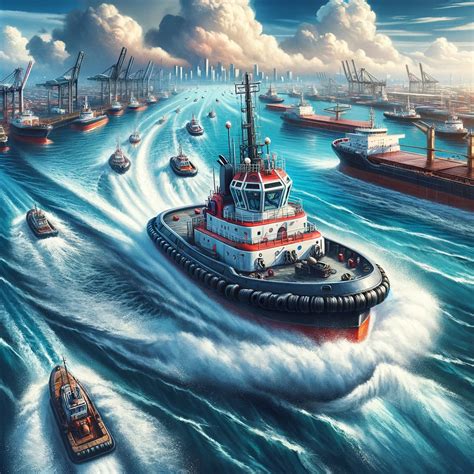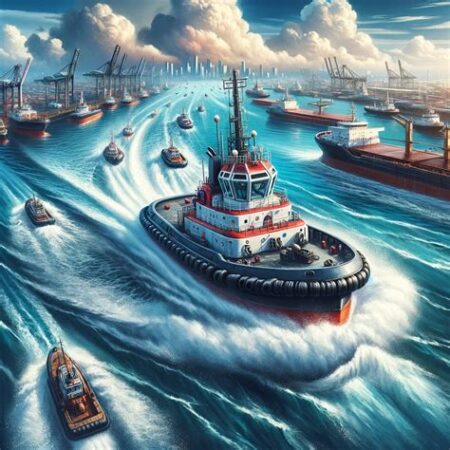
- Introduction
- Legal Framework of Towage
- Types of Towage
- Liabilities in Towage
- The Salvage Relationship
- Table Breakdown of Towage Costs
- Conclusion
-
FAQ about Towage in Maritime Law
- 1. What is towage?
- 2. What are the different types of towage?
- 3. What are the legal duties of a tugboat?
- 4. What are the legal duties of the vessel being towed?
- 5. What is the effect of weather conditions on a towage operation?
- 6. What is a towage contract?
- 7. Who is liable for damage caused by a towage operation?
- 8. What is a salvage operation?
- 9. What is the difference between towage and salvage?
- 10. What is the law governing towage and salvage?

Introduction
Greetings, readers! Welcome to our in-depth exploration of towage in maritime law. Towage plays a vital role in maritime businesses, facilitating the safe movement of various vessels. In this article, we will delve into the intricacies of towage operations and the legal frameworks governing them. Get ready to navigate the waters of towage law with us!
Towage is a maritime service where one vessel (the tug) assists another vessel (the tow) in maneuvering, berthing, unberthing, or moving it through a body of water. The tug provides the necessary power and control to facilitate the tow’s safe and efficient movement. Towage services are indispensable in various maritime operations, including harbor operations, shipyards, and salvage operations.
Legal Framework of Towage
Towage Contracts
Towage operations are typically governed by a written towage contract between the owner of the tug and the owner of the tow. These contracts outline the terms and conditions of the towage service, including the duration, destination, payment, and responsibilities of both parties. Maritime law places a high emphasis on the clarity and specificity of towage contracts to avoid misunderstandings and disputes.
Tug Owner’s Duties
The tug owner is primarily responsible for providing a seaworthy tug that is fit for the intended towage operation. The tug owner must also ensure that the tug is adequately crewed and equipped to perform the service safely and efficiently.
Tow Owner’s Duties
The tow owner is responsible for ensuring that the tow is seaworthy and properly equipped for the towage operation. Additionally, the tow owner must provide accurate and timely information to the tug owner regarding the tow’s condition and any special requirements.
Types of Towage
Harbor Towage
Harbor towage involves the movement of vessels within a harbor or port area. Harbor tugs are typically used to assist ships with berthing, unberthing, and maneuvering within the harbor. They ensure the safe and efficient flow of vessels within the harbor and prevent accidents and collisions.
Coastal Towage
Coastal towage is the towing of vessels along a coastline or between nearby ports. Coastal tugs are typically larger and more powerful than harbor tugs and are equipped to handle longer tows in open waters. Coastal towage often involves the transportation of barges, disabled vessels, or other floating structures.
Offshore Towage
Offshore towage involves the towing of vessels or structures in offshore areas, typically for oil and gas exploration and production activities. Offshore tugs are highly specialized vessels designed to withstand harsh weather conditions and operate in remote locations. They are used to tow rigs, platforms, and other offshore structures.
Liabilities in Towage
Liability for Damage to the Tow
The tug owner is generally liable for any damage caused to the tow during the towage operation, unless such damage is caused by the negligence or fault of the tow owner. The tow owner may also be liable for any damage caused to the tug by the tow.
Liability for Delay
The tug owner is liable for any delay in the towage operation caused by the negligence or fault of the tug owner or its crew. The tow owner may also be liable for any delay caused by the negligence or fault of the tow owner or its crew.
The Salvage Relationship
In certain circumstances, a towage operation may evolve into a salvage operation. A salvage operation occurs when a vessel or its cargo is in danger of being lost or damaged and assistance is provided to save it. Salvage operations are governed by a separate legal framework that determines the rights and responsibilities of the parties involved.
Table Breakdown of Towage Costs
| Factor | Considerations |
|---|---|
| Vessel Size | Larger vessels typically require more powerful tugs and longer tow lines, resulting in higher costs. |
| Distance | Towage costs increase with the distance of the tow. Offshore tows are generally more expensive than harbor tows. |
| Weather Conditions | Adverse weather conditions, such as high winds or rough seas, can increase towage costs due to the need for additional safety measures. |
| Tug Availability | The availability of tugs in a particular area can affect the cost of towage. If there is a shortage of tugs, costs may be higher. |
| Tow Specific Requirements | Specialized equipment or requirements for the tow can impact the cost of towage. |
Conclusion
Towage in maritime law is a complex and multifaceted field that plays a critical role in the safe and efficient movement of vessels. The legal framework governing towage operations ensures that the rights and responsibilities of the parties involved are clearly defined and protected. Understanding the legal aspects of towage is essential for all participants in the maritime industry, including tug owners, tow owners, and legal professionals.
Thank you for joining us on this journey through towage in maritime law. Stay tuned for our upcoming articles, where we will explore other fascinating topics related to maritime law and vessel operations. Safe sailing, readers!
FAQ about Towage in Maritime Law
1. What is towage?
Towage is the act of pulling or assisting a vessel through the water by another vessel.
2. What are the different types of towage?
There are two main types of towage:
- Assistant towage: This is where a tug assists a vessel in maneuvering or berthing.
- Long-distance towage: This is where a tug tows a vessel over a long distance.
3. What are the legal duties of a tugboat?
A tugboat has a number of legal duties, including:
- To use reasonable care and skill in towing the vessel.
- To follow the instructions of the vessel’s master.
- To maintain a safe distance from the vessel.
- To keep the vessel in tow until it is safely moored.
4. What are the legal duties of the vessel being towed?
The vessel being towed also has a number of legal duties, including:
- To provide the tugboat with all necessary information about the vessel.
- To follow the instructions of the tugboat’s master.
- To maintain a proper lookout.
- To take all reasonable steps to prevent damage to the tugboat or the vessel being towed.
5. What is the effect of weather conditions on a towage operation?
Weather conditions can have a significant impact on a towage operation. Strong winds, waves, and currents can make it difficult for the tugboat to control the vessel being towed. In some cases, weather conditions may make it impossible to safely tow a vessel.
6. What is a towage contract?
A towage contract is a contract between a tugboat operator and the owner of the vessel being towed. The contract sets out the terms and conditions of the towage operation, including the price, the route, and the duration of the tow.
7. Who is liable for damage caused by a towage operation?
Liability for damage caused by a towage operation will depend on the circumstances of the case. In general, the tugboat operator will be liable for damage caused by the negligence of its employees. The owner of the vessel being towed may be liable for damage caused by the negligence of its employees.
8. What is a salvage operation?
A salvage operation is an operation to save a vessel or its cargo from danger or distress. Salvage operations are typically carried out by salvage companies.
9. What is the difference between towage and salvage?
Towage is a commercial operation, while salvage is a non-commercial operation. Towage is typically carried out under a contract, while salvage is typically carried out without a contract.
10. What is the law governing towage and salvage?
Towage and salvage are governed by a number of international conventions and national laws. The most important international conventions are the International Convention on Salvage, 1989, and the Convention on the Law of the Sea.




